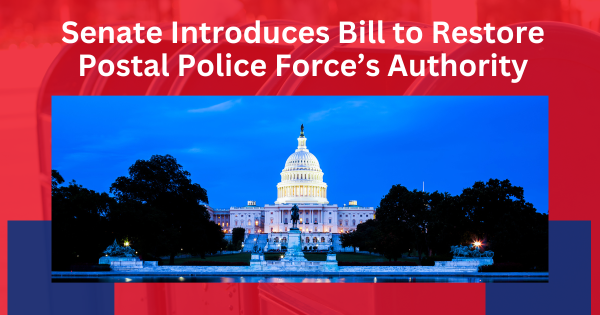Senate Introduces Bill to Restore Postal Police Force's Authority
Senate Introduces Bill to Restore Postal Police Force’s Authority
By Bob Levi
NAPS Director of Legislative & Political Affairs
The USPS doth protest too much, methinks.” (Apologies to William Shakespeare’s Queen Gertrude in “Hamlet.”)
In late November, Senate Judiciary Committee Chairman Richard Durbin (D-IL) and Ranking Senate Appropriations Committee Republican Susan Collins (R-ME) introduced long-awaited legislation to help better protect USPS employees who deliver mail and packages, improve safeguards for postal property and ensure the sanctity of the U.S. Mail.
S. 3356 is the Senate companion to H.R. 3005, legislation introduced by Reps. Andrew Garbarino (R-NY) and William Pascrell (D-NJ). The Senate bill is crafted in such a way to fall within the jurisdiction of the committee chaired by Durbin.
Generally, the Durbin-Collins bill would clarify the section of the U.S. criminal code relating to the investigative powers of Postal Service personnel. Specifically, the legislation would make clear that postal police officers may exercise full law-enforcement authority on and off postal real estate to protect postal employees in the conduct of postal activities, as well as safeguarding the mail and postal assets.
In summer 2020, the USPS irresponsibly decided to restrict its police force to guard postal real estate, making postal employees delivering mail and postal assets vulnerable. NAPS has been collaborating with the Postal Police Officers Association on the House and Senate legislation. On introduction of S. 3356, the National Association of Police Organizations (NAPO), a national coalition of police associations representing more than 241,000 sworn law-enforcement officers, notified members of the Senate of its strong support of the measure and urged prompt passage.
The latest endorsement is from the Federal Law Enforcement Officers Association. The organization represents more than 26,000 federal law enforcement officers from 65 different federal agencies, including Postal Inspectors.
Regrettably, the Postal Service has opposed restoring full law-enforcement authority to its police force. At times, the agency asserted that postal police never provided protection off postal real estate. This was disproven.
At other times, the USPS argued that already-offered, taxed local police were better situated to protect postal employees. NAPO’s endorsement suggests otherwise. The USPS also has argued that postal police do not have the staffing to protect off-property personnel and assets. Now, who reduced the postal police force?
Finally, the USPS contended that the USPS police force is not trained to perform law enforcement. This allegation is false.
In response to a national outcry on Capitol Hill and in the national news media, the USPS is attempting to secure mail collection boxes by phasing out “arrow keys” and the ad hoc, limited, temporary deployment of the Postal Inspection Service. Unfortunately, such band-aids are too little, too late.
The Postal Service’s over-the-top objection to the legitimate use of postal police officers is reminiscent of the agency’s vehement objection to establishing an inspector general about 28 years ago. The USPS and its Inspection Service fanned opposition to creation of the Office of Inspector General (IG), arguing the Inspection Service was the entity authorized to conduct auditing and oversight functions.
At that time, Congress lacked confidence that the Inspection Service was adequately performing those duties. Presently, Congress has deep reservations about the Inspection Service’s capability to properly protect postal personnel and assets absent legislation to clarify the role of dedicated and well-trained postal police officers. The USPS’ 1996 objection to creation of the IG failed.
NAPS is encouraged by the growing bipartisan and bicameral support for a reinvigorated postal police force. Congress will, once again, overcome USPS opposition.
Another matter is scrutiny of the agency’s facility realignment plan. The plan’s implementation and apparent impact on First-Class Mail performance have warranted public and congressional attention. The performance decline has not abated, even during peak mail season. In fact, national First-Class on-time performance fell to 84.21% on-time during the last week in November, a 6.6% decline compared to the same period last year.
This phenomenon has caught the attention of Senate Homeland Security and Governmental Affairs Committee Chairman Gary Peters (D-MI) and other members of Congress. On Dec. 5, Peters sent the Postmaster General a four-page letter listing nine questions that asked for detailed explanations relating to postal performance and realignment. The chairman’s inquiry alleges the lack of transparency in realignment.
Individual members of the Senate and House also have communicated their displeasure to the USPS regarding on-time performance. In fact, Sens. Amy Klobuchar (D) and Tina Smith (D) of Minnesota introduced S. 3391, the Postal Delivery Accountability Act, in response to poor mail performance to their constituents. The bill would put into law USPS IG recommendations for improving, identifying and notifying delayed and undelivered mail.
As mentioned in last month’s column, First-Class on-time performance continues to suffer in postal districts represented by key members of Congress, including House Oversight and Accountability Chairman James Comer (R-KY) and the committee’s ranking Democrat, Jamie Raskin (D-MD). Of course, there also is the ongoing Postal Regulatory Commission’s public inquiry on postal facility realignment that, hopefully, will guide the Postal Service as the agency adjusts its expectations and plans regarding network changes.
Not surprisingly, Postal Service leadership continues to bemoan legitimate and essential congressional and regulatory oversight of the “Delivering for America” plan, asserting that such legally authorized actions have derailed postal solvency.
As this column went to press, the USPS Board of Governors “gained” two vacancies. On Dec. 8, Governors Donald Moak and William Zollars termed out. The White House has yet to nominate anyone to fill the two vacancies, so the board will function with seven nominated governors—five nominated by President Biden and two nominated by former President Trump. NAPS is pushing to have the two vacancies filled expeditiously.
